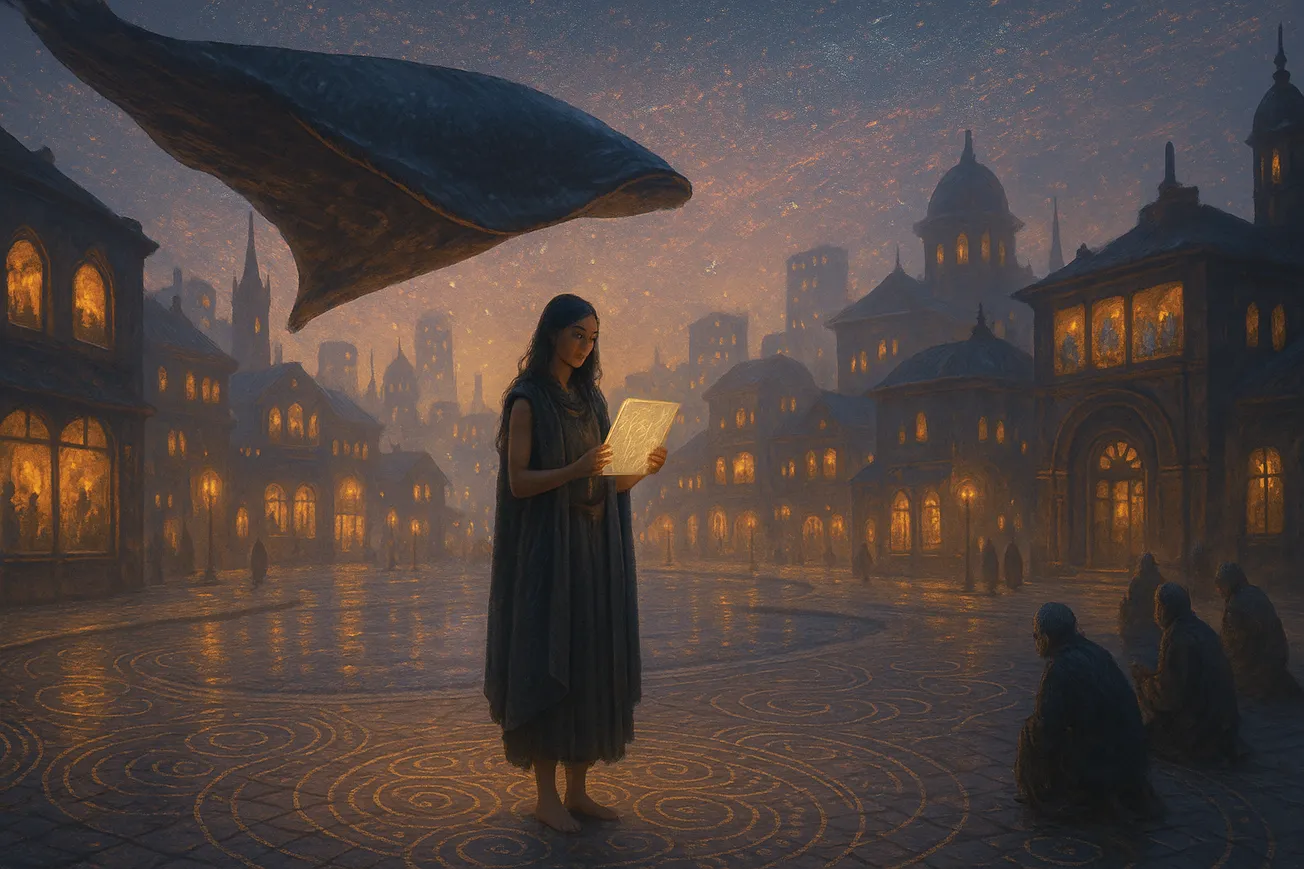🌈 The Fractal Story Engine | Mind & Meaning | (35) MM-008-F2
In the city of Cephra, each window faced inward. Not inward as in the direction of a courtyard or the heart of a house, but toward the mind. Every pane of glass was calibrated to memory, tuned to reflect the exact thought one had just before waking.
No one quite remembered who designed the city, but the architecture had rules. You could not paint your door. You could not whistle in the alleys. And once a day, for one second, everything faltered.
The faltering was called the Static. No alarms rang. No clocks twitched. But things rearranged themselves in infinitesimal ways. A dog might walk with a limp it never had before. A letter you never wrote might appear on your desk. Most people looked away. Some muttered prayers. But there was one girl. Her name was Ula, and she collected the seconds.
She was not a prophet. Not an oracle. She worked in the Envelope District, where correspondence was folded and sealed. But in a cloth bag she carried at all times, Ula kept what she called her Static Samples.
A melted coin. A clock gear made of ash. A slipper-sized map etched in moving ink.
People whispered. They said she was cursed, or touched by the city’s Eye. But Ula never claimed insight. She only waited.
Each morning, she stood in the square beneath the Fountain of All Hours, barefoot on the tile that read THIS IS THE BEFORE. She held nothing in her hands. She made no gesture. But she watched. And when the Static arrived, she would sometimes catch something that had not been there before.
One Tuesday, a folded insect made of red salt appeared in her palm. It beat its wings once and dissolved.
On a Thursday, her left thumbnail was replaced with a perfectly smooth stone carved with the letter Φ.
Each artifact was logged, then stored. She was methodical. Even reverent. But she never claimed to understand.
Until the glitch turned inward.
That day, when the Static came, nothing external changed. The streetlamps did not rotate. The clouds held their positions. But Ula saw a person standing beside her.
It was herself.
Not mirrored. Not dreamlike. Not a memory.
The other Ula wore a paper tunic and a crown made of bent sewing needles. She did not speak. She handed Ula a notebook. It was stitched from eel leather, and its pages were thin and translucent.
Inside were diagrams. Intricate, recursive patterns that looked like topography, but shifted with each breath. Ula turned a page and saw her own face drawn in violet charcoal.
The next page held a question written in a language she had never seen, but somehow recognized.
It asked, simply, what she would do if she stopped collecting and started listening.
Then the other Ula vanished.
In the days that followed, Ula no longer brought the cloth bag. She began to stand stiller. Longer. Her eyes no longer scanned for irregularities. Instead, they softened, as if preparing to see without focusing.
The city responded.
Birds began gathering on rooftops in perfect squares. Water in fountains rose slightly before each glitch, then descended with a quiet suggestion of breath.
People began bringing her items. A painting that aged in reverse. A coin that whispered apologies. A string of letters never delivered but addressed to the unborn.
Ula stopped archiving.
She started planting the artifacts.
In parks. In the seams between bricks.
She said nothing, but the city began to hum differently. Not louder. Just with a kind of acknowledgment.
Some mornings, strangers woke with the distinct memory of a conversation they had not had. One where a woman in eel leather robes asked them the same question.
Others began to gather in the square. They came not to look. They came to feel.
And when the Static arrived, the city would pause. Not because of fear or confusion. It paused with a kind of attention.
It was never explained.
But after a while, every citizen carried something in their pocket. A scrap. A sketch. A moment too strange to dismiss.
And none of them claimed to understand.
But they all agreed on one thing:
The second was no longer empty.
It was a key.
And they were learning, together, how to turn it.

